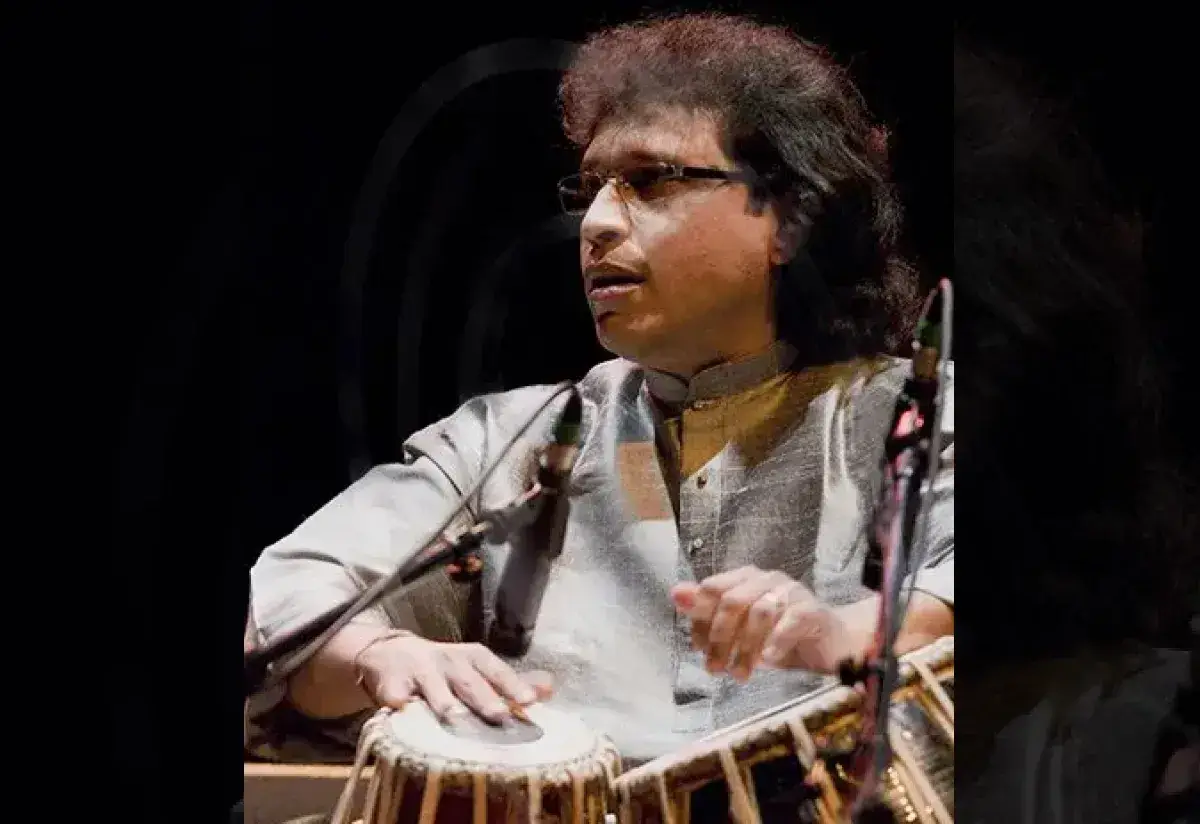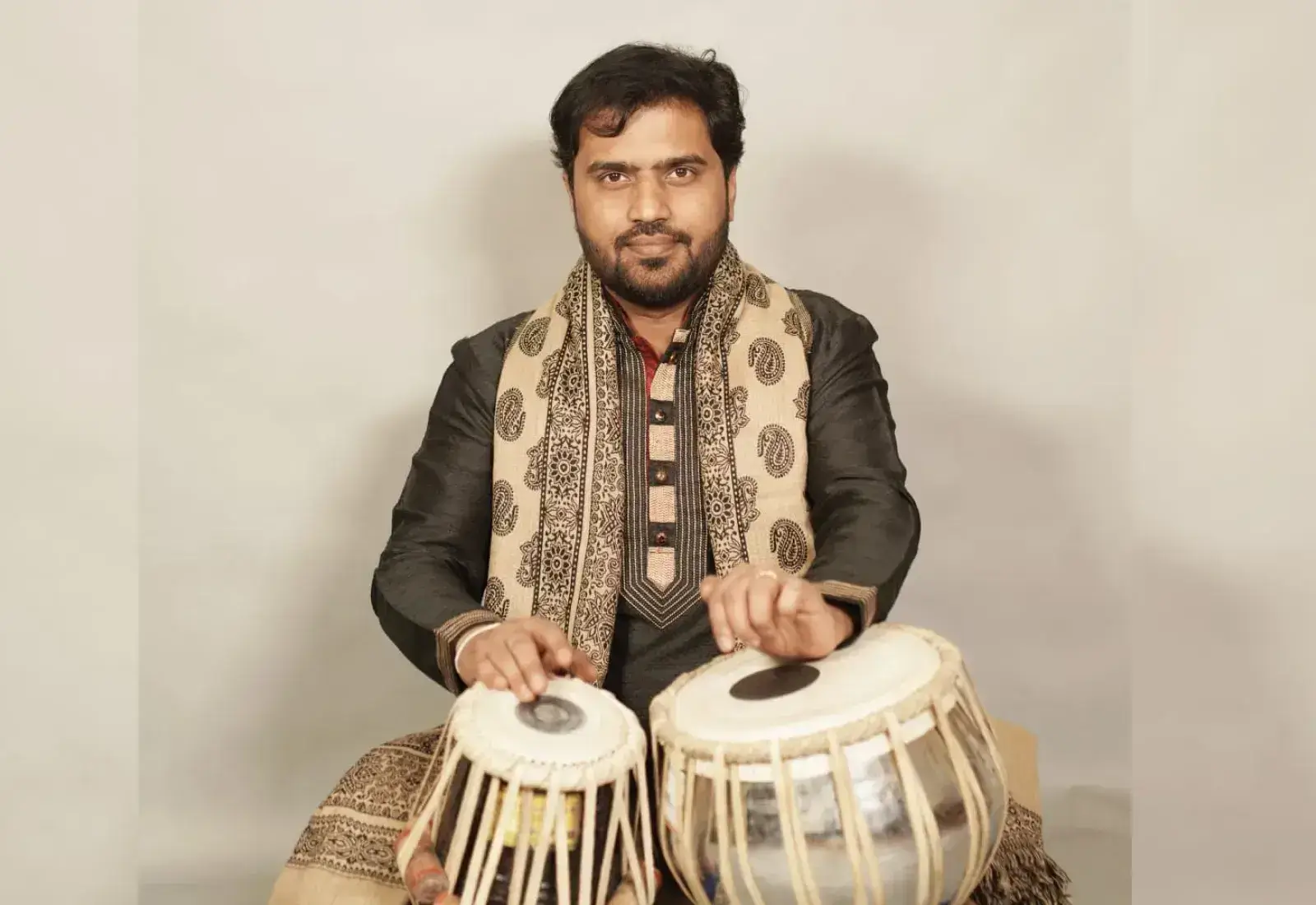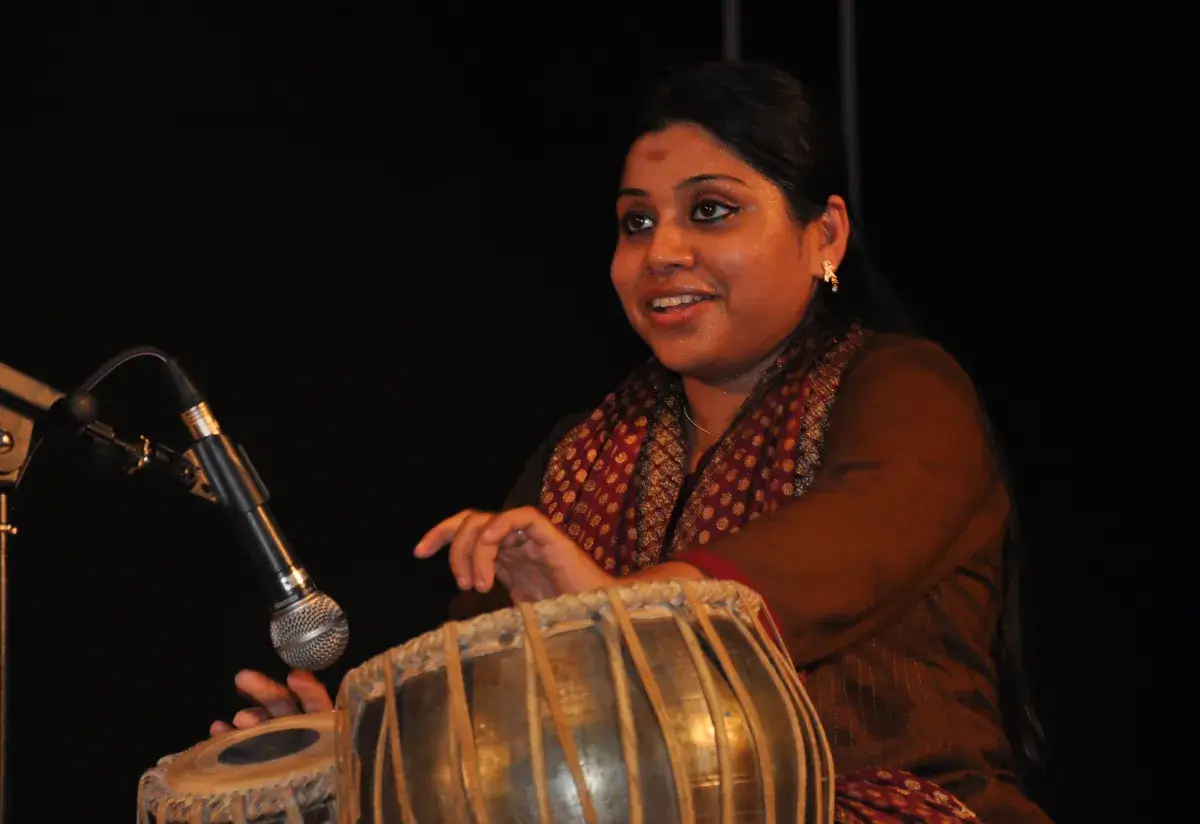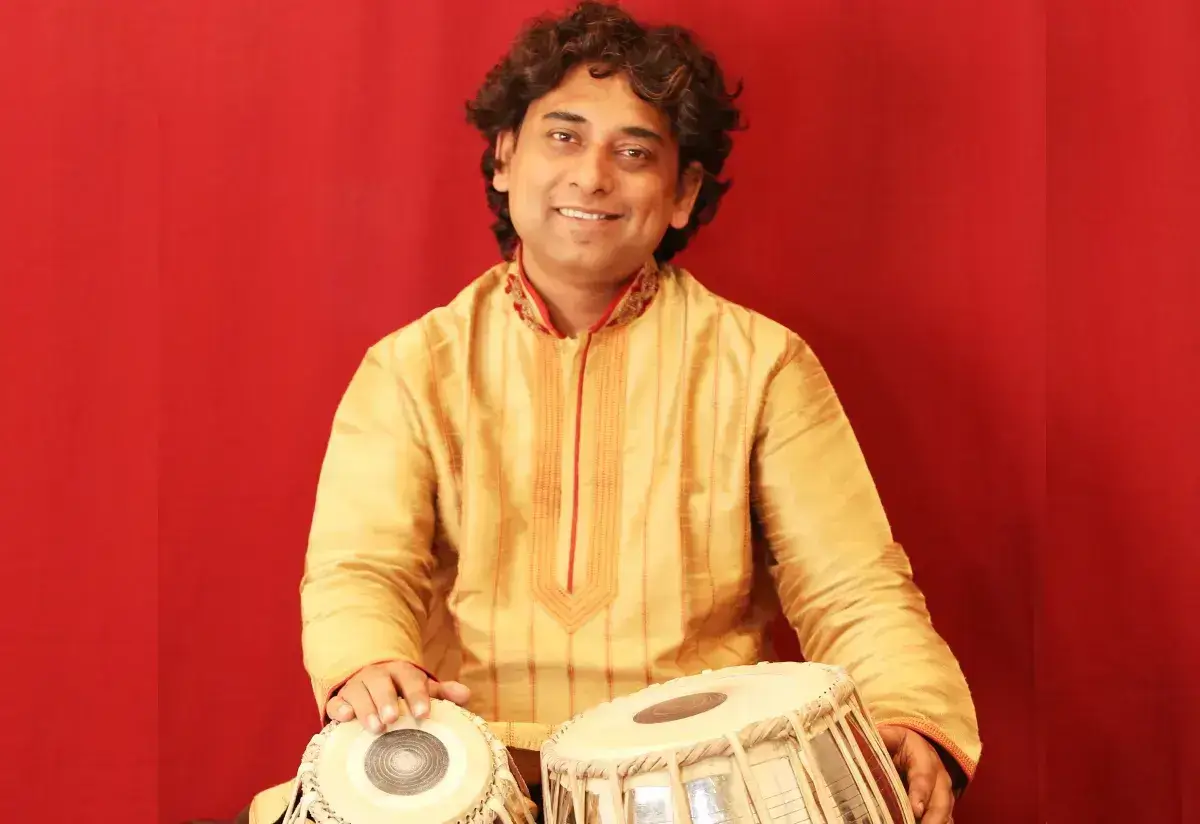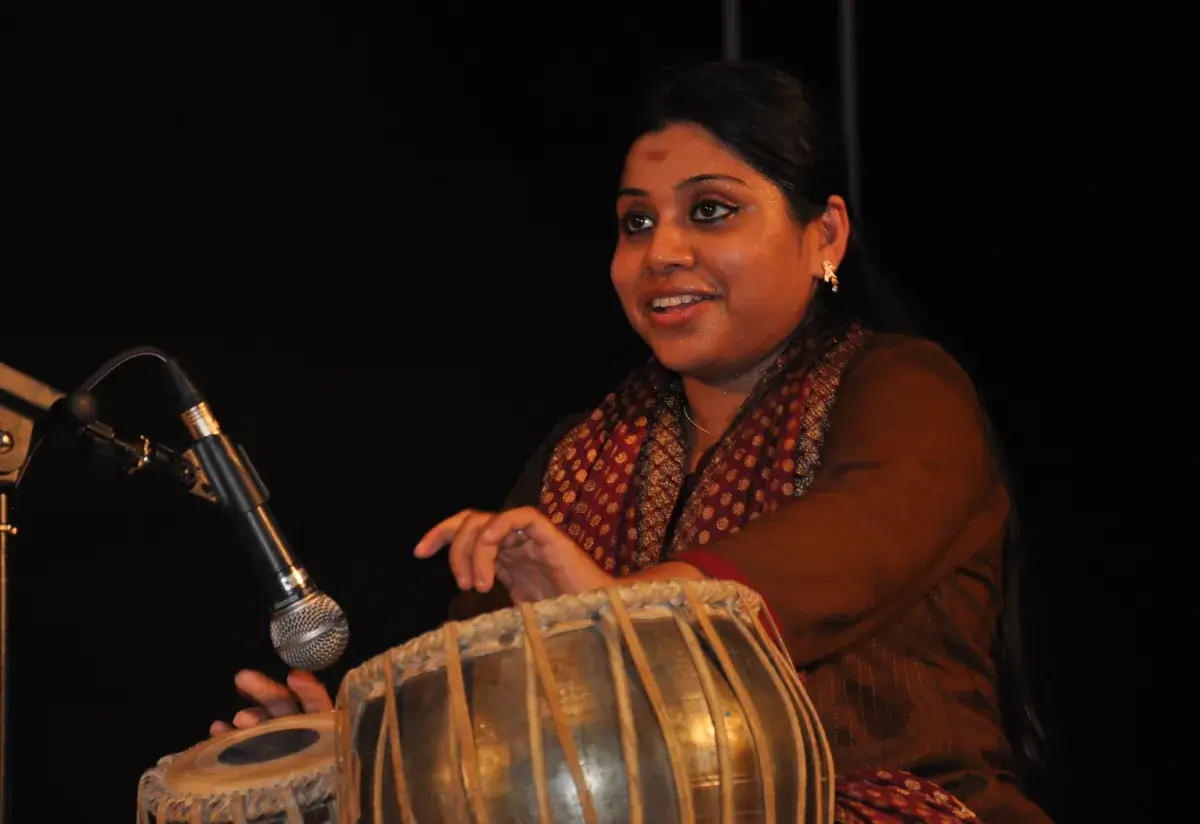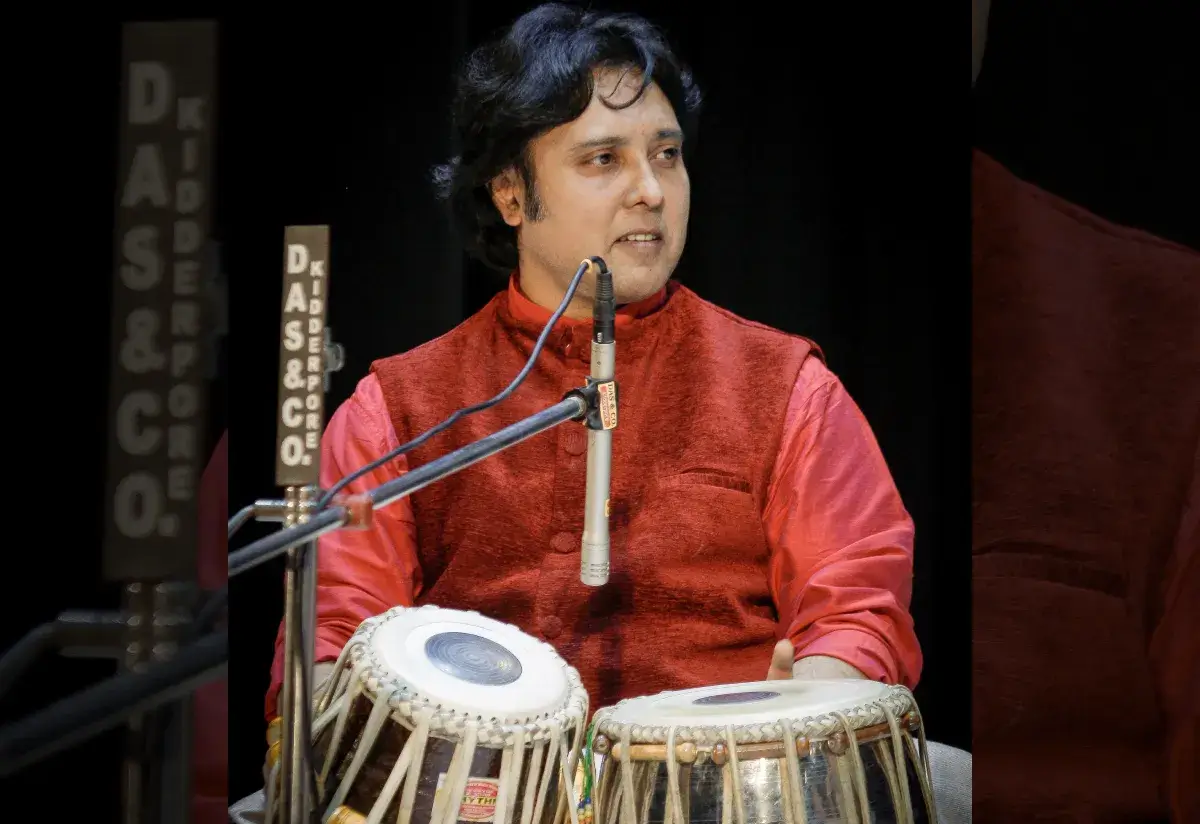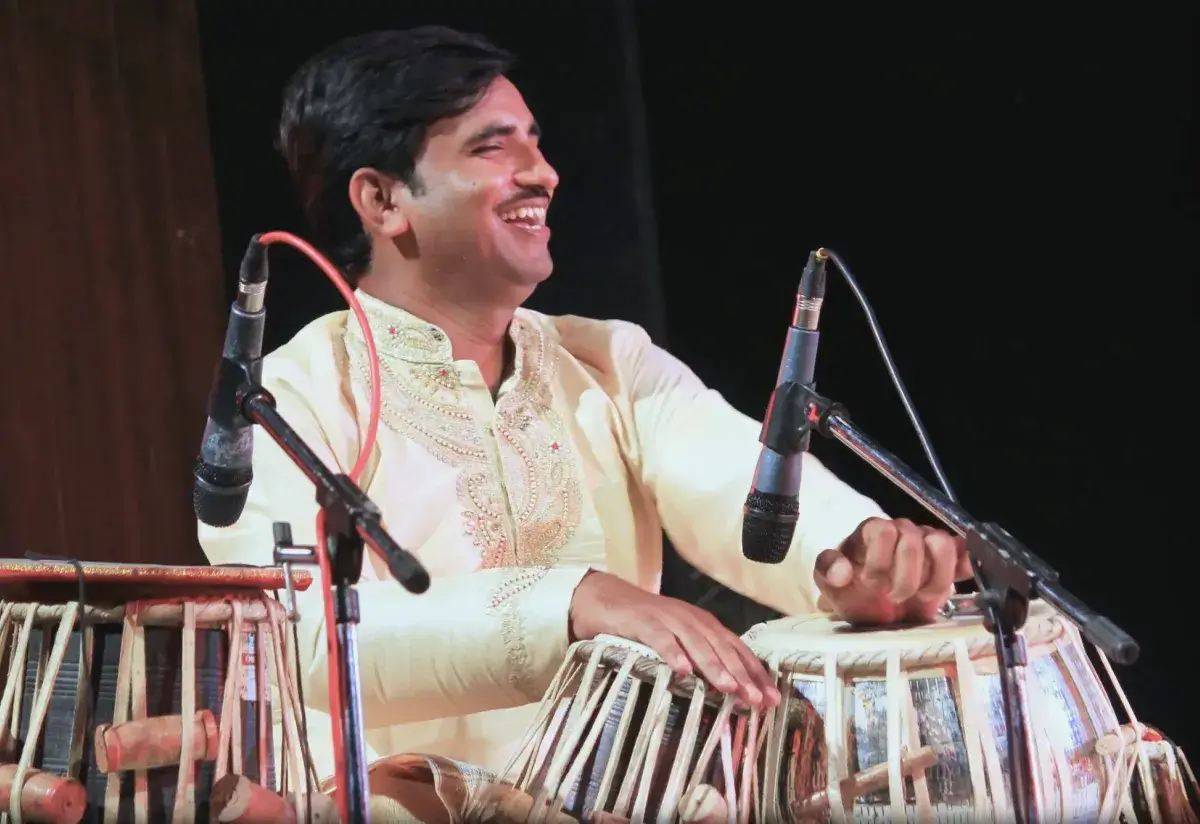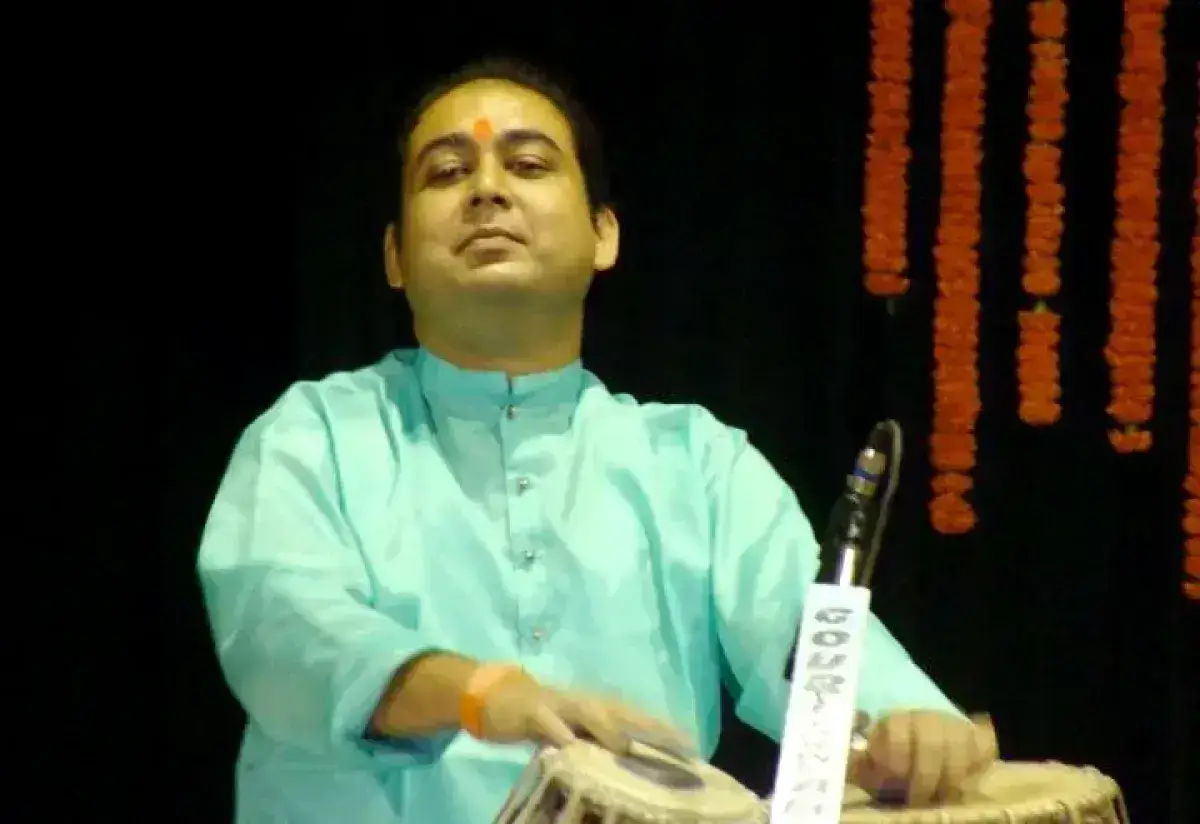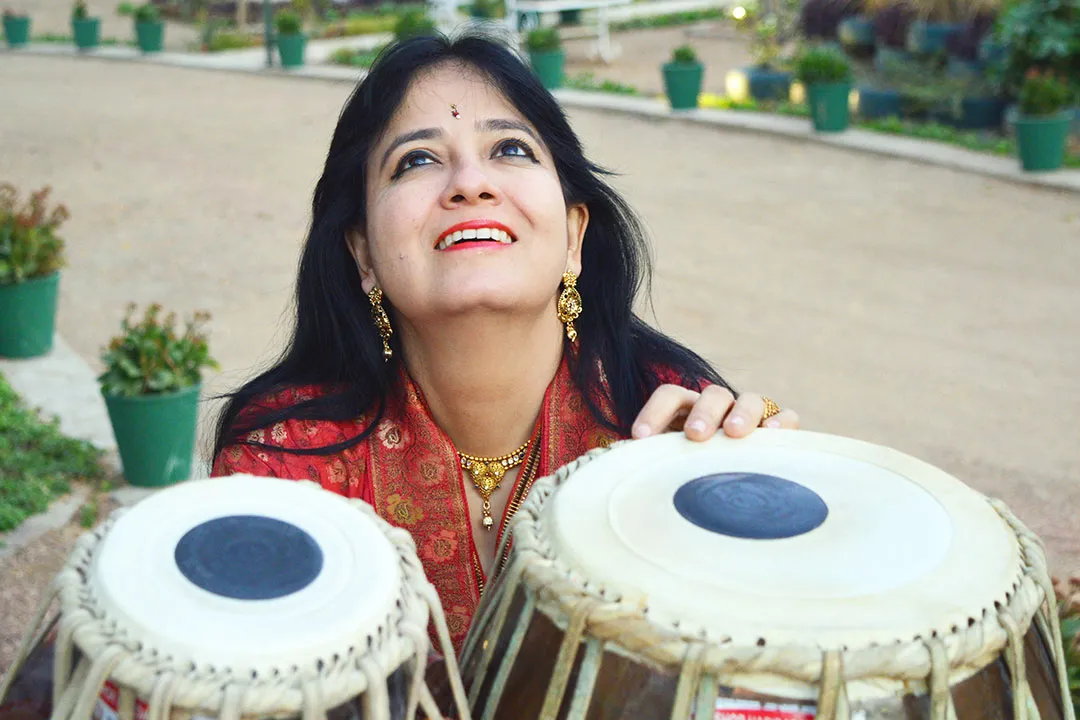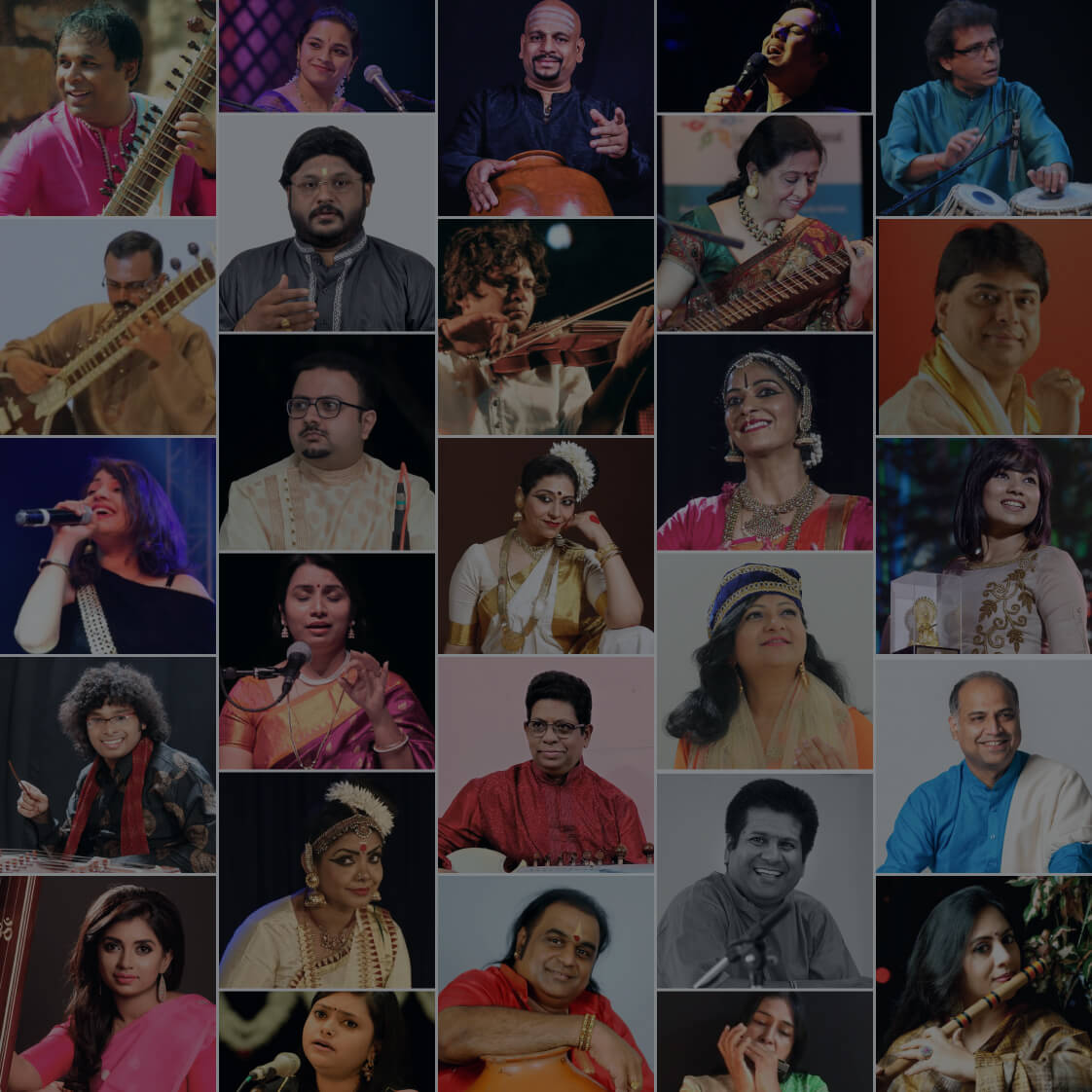Introduction
| Date of Birth | 9th March 1951 |
| Place of Birth | Bombay (Now Mumbai) |
| Birth Name | Zakir Allarakha Qureshi |
| Date of Death | 15th December 2024 |
| Place of Death | San Francisco, California, USA |
| Profession | Tabla Player, Musician |
| Spouse | Antonia Minnecola |
| Children | Anisa Qureshi and Isabella Qureshi |
| Father | Alla Rakha Qureshi |
| Mother | Bavi Begum |
| Sibling | Taufiq Qureshi and Fazal Qureshi |
| Awards | Padma Shri, Padmaa Bhushan, Padma Vibhushan, Sangeet Natak Akademi Award, The United States National Endowment for the Arts' National Heritage Fellowship, Grammy Awards |
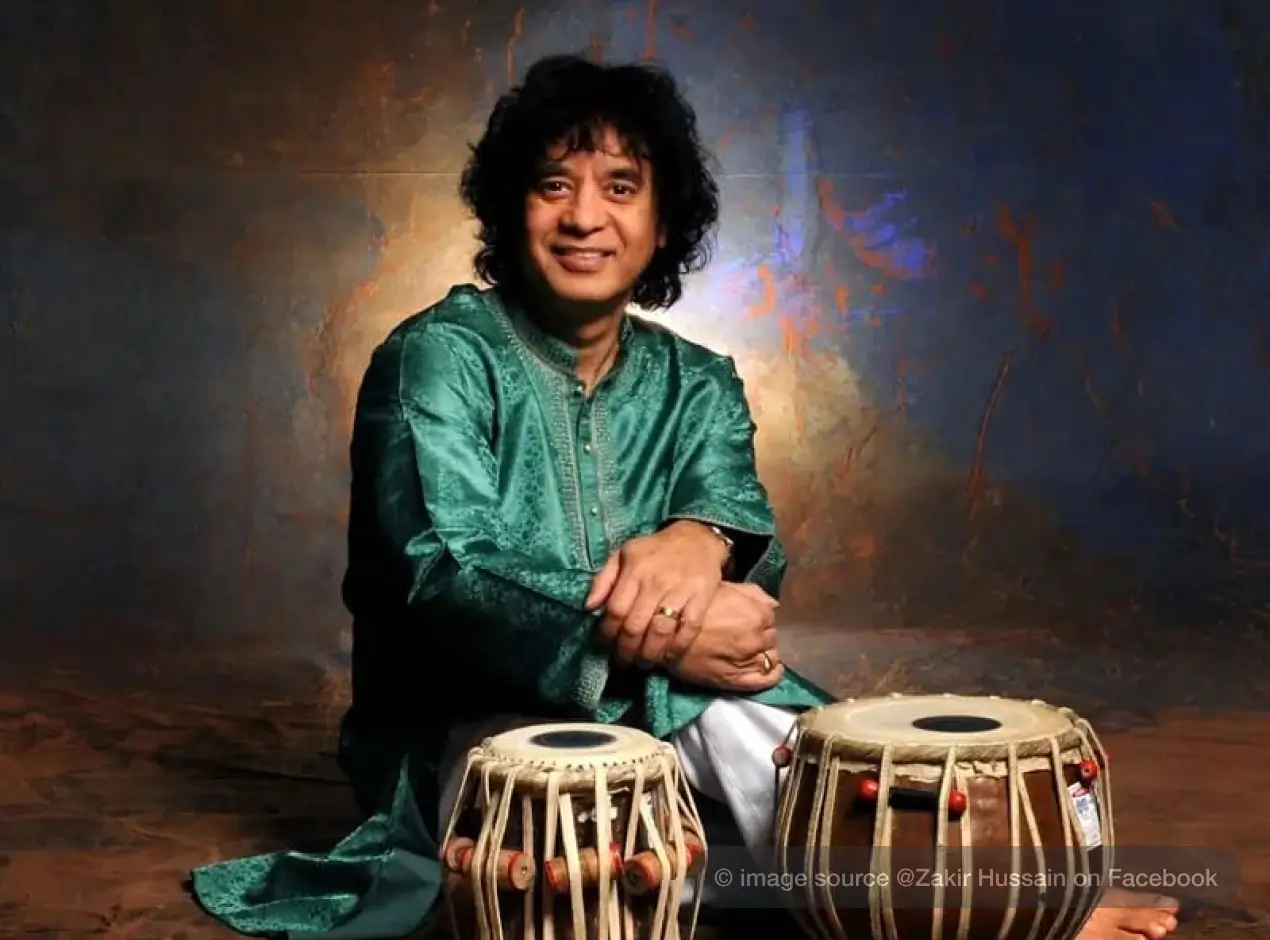
Zakir Hussain - a man who is not just a virtuoso, but a phenomenon—a living embodiment of rhythm, grace, and intellect. His fingers weave stories on the tabla. His words resonate with wit and wisdom. And his presence is a celebration of music itself.
Zakir's tabla recitals sound like conversations he has with the tabla. A beautiful camaraderie develops between the man and the instrument that candidly wraps the audience in its embrace.
What sets Zakir apart isn’t just his unparalleled mastery over the tabla but the way he connects with people—both on and off stage. His unique ability to blend Indian classical music seamlessly with genres from around the globe. He has collaborated with legends of jazz, rock, and world music, yet every collaboration feels like a conversation—deep, meaningful, and alive.
But it’s not just his music that captivates. Zakir Hussain’s stage presence is magnetic, and his sense of humor is as prompt as his fingers on the tabla. He would explain complex rhythmic patterns with vivid and relatable metaphors. Even people who do not understand Indian classical music find themselves drawn into it.
Zakir Hussain could connect with divinity and remain earthly at the same time. His deep and transcendental recitals would feel like he has traversed to the other world. And just then, he will shake his head in his signature style, his hair falling on his face and back. And he will break into a child-like smile making eye contact with the audience.
What follows next is yet another funny anecdote. His interaction with the audience acted as a breather for him as well as his admirers in the middle of an intense recital.
Whether it’s recounting his travels with his legendary father, Ustad Alla Rakha, or describing the chaos of juggling a global tour schedule, Zakir’s stories remind us that even maestros are human—and hilariously too.
Above all, Zakir Hussain embodies the profound legacy of Indian rhythm. He is a guardian of the ancient rhythmic traditions of India. Yet he approached them with a modern sensibility, bridging the past and the present. His knowledge of Indian rhythmic systems, or tala, is encyclopedic, and his ability to innovate within its framework has made him a trailblazer.
Early Life and Education
Zakir Hussain was born on March 9, 1951, in Mumbai, India. He was the eldest son of the renowned tabla maestro Ustad Alla Rakha and Bavi Begum. His father, a prominent figure in Indian classical music, began teaching him tabla rhythms from a very young age.
Zakir started performing by the age of seven. He received his formal education from St. Michael's High School in Mahim and later St. Xavier's College in Mumbai. After this, he went on to complete a doctorate in music.
Training in Tabla
Zakir Hussain’s relationship with the tabla began long before he could even walk. Born into a family of musicians, he was destined to become a tabla virtuoso. His father, the legendary Ustad Alla Rakha, was a revered tabla maestro. He had a major transformative influence on Zakir's musical journey.
Zakir shared a heartwarming anecdote in an interview. The first words that his father spoke into his ears as an infant when he lifted him up in his hands for the first time were the bols of tabla. That's a pious devotee of Indian classical music greeting his successor who will eventually take the legacy ahead.
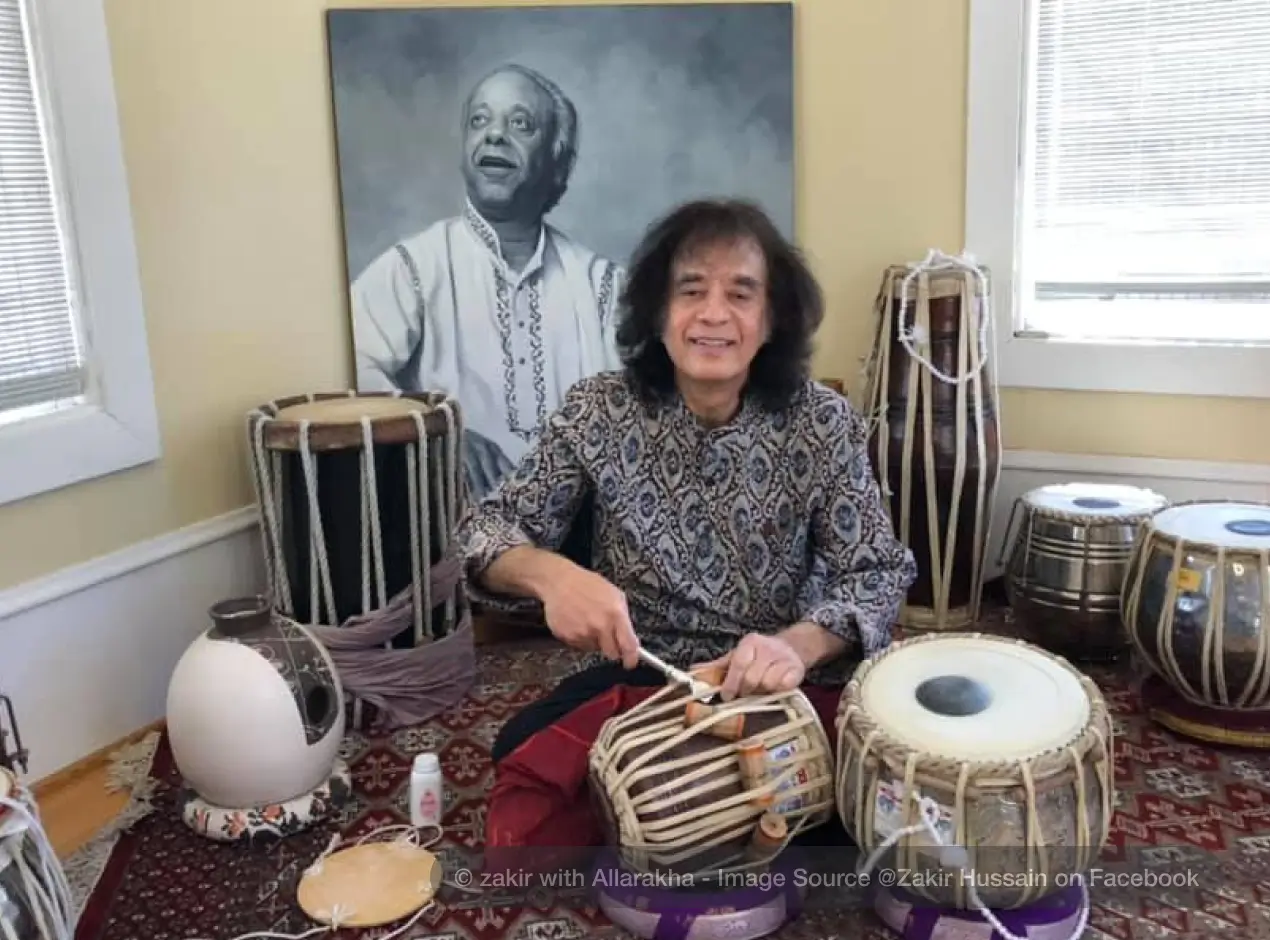
Zakir’s early training under his father's guidance laid the foundation for his unparalleled skill and deep understanding of rhythm. From a very young age, Zakir Hussain was immersed in the world of tabla.
Ustad Alla Rakha was a strict teacher. His lessons were filled with wisdom, discipline, and love for music. He not only taught Zakir the traditional rhythmic patterns but also instilled a profound respect for the tabla and its rich history.
Zakir recalls how his father would make him practice the basic "bols" (rhythmic syllables) and traditional compositions for hours, ensuring that each stroke on the tabla was perfect. “Abba used to say, ‘When you play, let every beat be a prayer,’” Zakir recalls with fondness. His father’s approach was grounded in spirituality, emphasizing that the rhythm of the tabla is not just a technical exercise but an offering to the divine.
Child Prodigy: Performances and Recognition
Zakir's talent was evident from an early age. He began performing in public at the age of seven, much earlier than most children of his age. His first performance was in Mumbai. It didn’t take long for his exceptional abilities to capture the attention of seasoned musicians and connoisseurs. By twelve, he started performing with some of the greatest musicians of Indian classical music.
One of his most notable early performances was in 1970 when he was just 13 years old. Zakir played at the prestigious All India Radio concert, where his mastery over the tabla left the audience in awe. It was at this concert that he began to be recognized as a child prodigy, a prodigious talent who was not just the son of a great maestro but an emerging star in his own right.
Just like Zakir Hussain, there are many people with endless possibilities. But not everyone is lucky to have a father or mentor like Ustad Alla Rakha. However, like everything has a starting point, here is one that might help aspiring percussionists to push back all inhibitions and take a step ahead. Read - How to Play tabla? Tips for Beginners to Avoid the Initial Hitch.
The Influence of His Mentors: Learning Beyond His Father
While Ustad Alla Rakha was Zakir’s primary teacher, he was also influenced by other musical stalwarts. Though Zakir never had formal lessons with Ustad Thirakwa, he was inspired by his rhythmic inventiveness and nuanced understanding of tabla playing.
One of his major influences was Pandit Shivkumar Sharma, a renowned santoor virtuoso and composer. Their collaborative performances added another layer of depth to Zakir’s artistry. Together, they set a benchmark in cross-genre fusion.
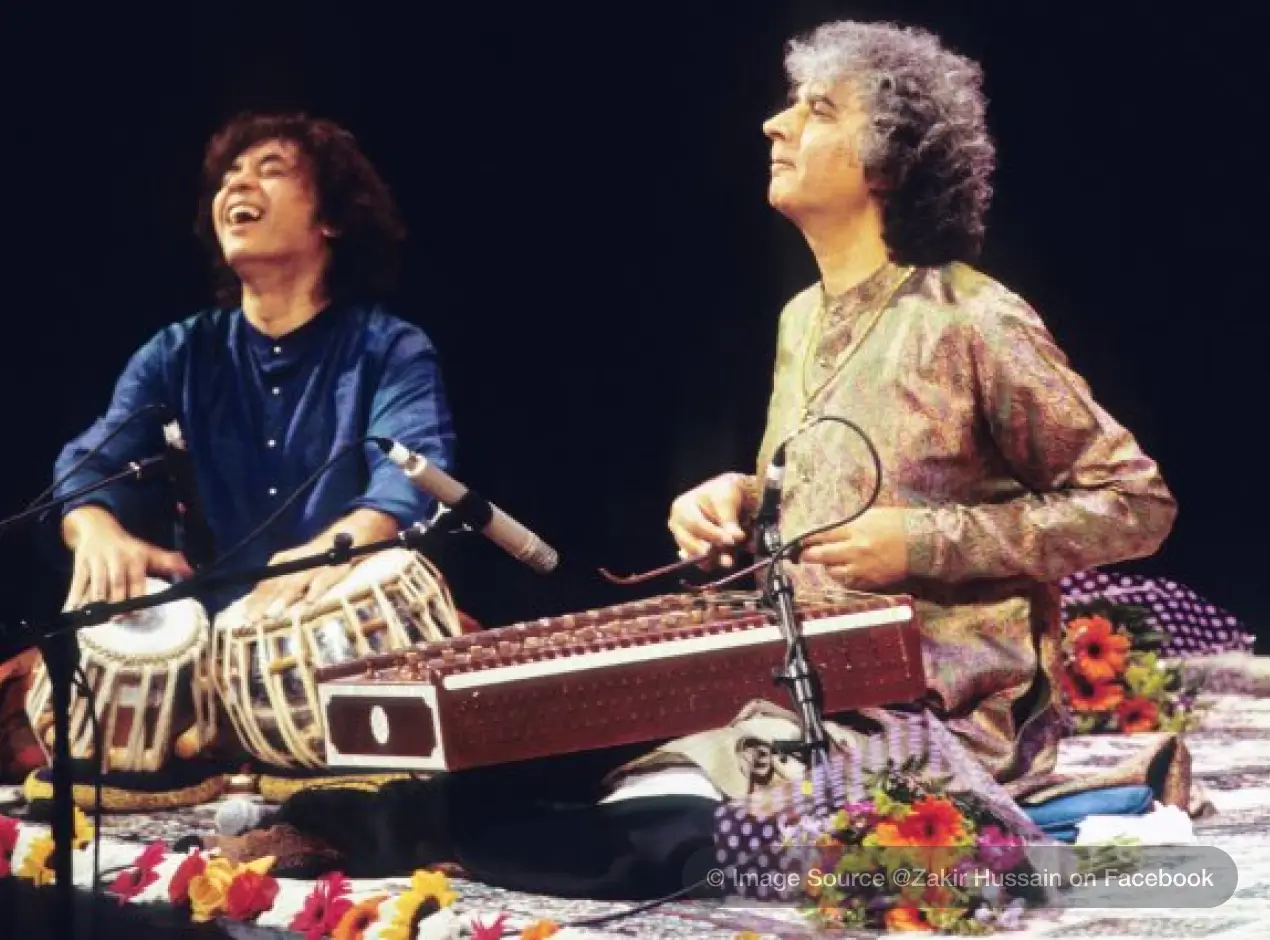
In the early years of his career, Zakir sought out opportunities to learn from many diverse masters in India. These included training under other respected tabla gurus within the Punjab gharana, that his father belonged to. Zakir would often sit in on lessons, absorbing intricate compositions and techniques from his father’s peers and contemporaries. These experiences helped him develop an expansive repertoire of rhythmic cycles, patterns, and improvisational skills.
Career
Zakir Hussain’s entry into the world of percussion seemed preordained. Even as a child, he displayed an intuitive understanding of rhythm that amazed those around him. He could replicate complex patterns after hearing them just once, a skill that left even seasoned musicians astounded. His father, recognizing his prodigious abilities, ensured that Zakir was exposed to a variety of musical settings. He played not just in classical concerts but also accompanied bhajans (devotional songs), film scores, and folk performances, broadening his rhythmic vocabulary.
One particularly memorable moment from his childhood was his first concert with his father. Zakir, still a teenager, was invited to accompany Ustad Alla Rakha at a major classical music festival in India. Nervous yet excited, he sat beside his father, playing with precision and grace that belied his age. The audience erupted in applause, and many senior musicians in attendance praised the young tabla player, calling him a natural successor to his father’s legacy.
A Trailblazer on the Global Stage
Zakir’s induction into the global world of percussion came early in his life, thanks to his father’s pioneering collaborations with international artists like Pandit Ravi Shankar and Yehudi Menuhin. In his late teens, Zakir joined these tours, where he got the opportunity to accompany his father and other stalwarts of Indian music. These tours introduced Zakir to Western audiences, where his extraordinary skill and charming demeanor made him an instant favorite.
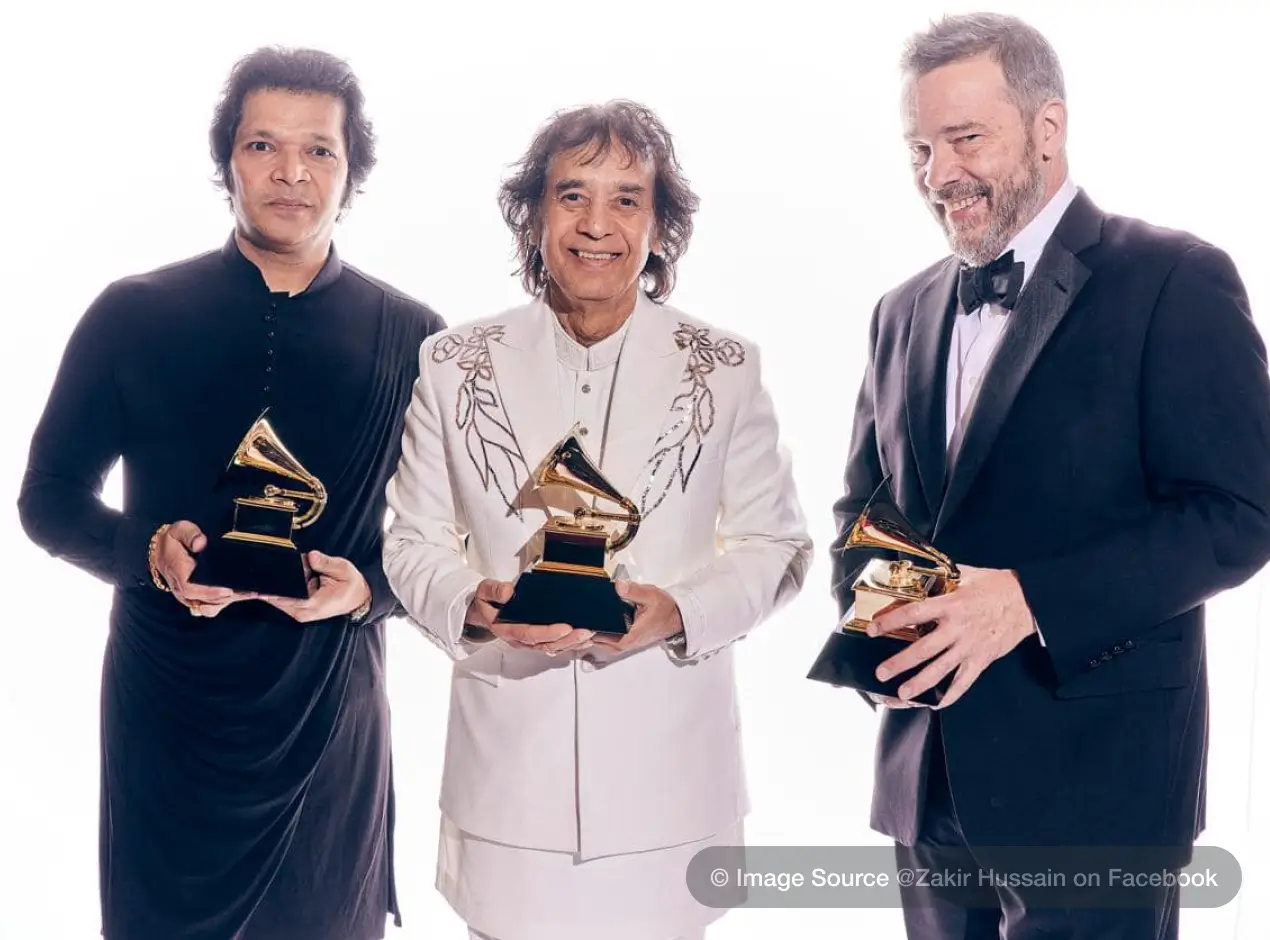
A pivotal moment in Zakir’s journey occurred when he moved to the United States in the early 1970s to study at St. Xavier's College, Mumbai, before transferring to the University of Washington in Seattle. While in the U.S., he began collaborating with musicians from various genres, including jazz, rock, and world music.
It was during this period that Zakir became a founding member of the fusion band Shakti, alongside guitar legend John McLaughlin and violin maestro L. Shankar. These collaborations helped Zakir merge the ancient rhythms of the tabla with contemporary sounds, creating a new, global language of percussion.
Throughout his career, Zakir collaborated with a diverse array of artists, including George Harrison, Yo-Yo Ma, and Mickey Hart of the Grateful Dead, further expanding the global appreciation of Indian percussion. His performances graced prestigious venues such as Carnegie Hall, the Kennedy Center, and the Royal Albert Hall, solidifying his status as a global ambassador of Indian music.
The Making of a Legend
Zakir Hussain’s relentless dedication to his craft, combined with his innovative spirit, made him more than just a master tabla player. He became a bridge between the classical and contemporary, the Indian and the global. His early years of rigorous training, performances as a child prodigy, and mentorship under legends prepared him to take the tabla to unprecedented heights.
Today, Zakir Hussain is celebrated not only as a virtuoso but as a transformative force in the world of music. His journey from a young boy practicing tabla under the watchful eyes of his father to becoming a global icon is a testament to his talent, discipline, and unwavering passion for rhythm. His story continues to inspire generations of musicians, reaffirming that greatness is achieved through a harmonious blend of tradition, innovation, and an enduring love for one’s art.
Awards and Achievements
Ustad Zakir Hussain's contributions to music were recognized with numerous accolades.
- In India, he was honored with the Padma Shri in 1988, the Padma Bhushan in 2002, and the Padma Vibhushan in 2023, among the nation's highest civilian awards.
- Internationally, he received the National Heritage Fellowship from the National Endowment for the Arts in 1999, the United States' highest honor in the traditional arts.
- His collaborative album Planet Drum with Mickey Hart earned a Grammy Award in 1992, and he garnered multiple Grammy nominations and wins throughout his career.
- In 2009, he received the Grammy for Best Contemporary World Music Album.
- Additionally, he was awarded the Sangeet Natak Akademi Award in 1991 and the Kyoto Prize in 2016, recognizing his profound impact on music and culture.
Personal Life
Zakir Hussain was married to Antonia Minnecola, an accomplished Kathak dancer and his manager. Their partnership was a testament to their shared passion for the arts. The couple had two daughters, Anisa Qureshi and Isabella Qureshi. Despite his global engagements, Zakir remained deeply connected to his family and Indian roots.
Books
Between 2016 and 2017, Nasreen Munni Kabir conducted a series of 15 in-depth interview sessions, each lasting approximately two hours, with Ustad Zakir Hussain. These conversations were compiled into the book Zakir Hussain: A Life in Music, published in 2018. The book offers readers an intimate glimpse into Hussain’s journey, tracing his formative years, rigorous training, and evolution into one of the world’s most celebrated musicians.
Discography
Zakir Hussain, the renowned tabla virtuoso, has an extensive and diverse discography that spans several decades and genres. Below is a detailed list of his notable recordings:
1970s: Foundations and Fusion
- 1970: Evening Ragas with Vasant Rai
- 1971: Shanti with the band Shanti
- 1972: Rolling Thunder with Mickey Hart
- 1975: Shakti with John McLaughlin
- 1975: Karuna Supreme with John Handy and Ali Akbar Khan
- 1976: A Handful of Beauty with Shakti
- 1976: Diga with Diga Rhythm Band
- 1977: Natural Elements with Shakti
1980s: Expanding Horizons
- 1980: Who's to Know with L. Shankar
- 1985: Song for Everyone with L. Shankar
- 1987: Making Music with Jan Garbarek, John McLaughlin, and Hariprasad Chaurasia
- 1989: Venu with Hariprasad Chaurasia
1990s: Global Collaborations
- 1990: At the Edge with Mickey Hart
- 1991: Planet Drum with Mickey Hart
- 1993: Concert for Peace with Ravi Shankar
- 1995: Raga Aberi with L. Shankar
- 1996: Mickey Hart's Mystery Box with Mickey Hart
- 1998: Supralingua with Mickey Hart
- 1999: Remember Shakti with John McLaughlin
2000s: Continued Innovation
- 2000: Tala Matrix with Tabla Beat Science
- 2001: Saturday Night in Bombay with Remember Shakti
- 2002: Live in San Francisco at Stern Grove with Tabla Beat Science
- 2006: Sangam with Charles Lloyd and Eric Harland
- 2007: Global Drum Project with Mickey Hart, Giovanni Hidalgo, and Sikiru Adepoju
- 2009: The Melody of Rhythm with Béla Fleck and Edgar Meyer
2010s: Mastery and Mentorship
- 2012: Mysterium Tremendum with Mickey Hart Band
- 2019: Good Hope with Dave Holland and Chris Potter
2020s: Recent Works
- 2020: Is That So? with John McLaughlin and Shankar Mahadevan
- 2022: In the Groove with Mickey Hart
- 2022: Trios: Sacred Thread with Charles Lloyd and Julian Lage
- 2023: As We Speak with Béla Fleck, Edgar Meyer, and Rakesh Chaurasia
- 2023: This Moment with Shakti
This discography highlights Zakir Hussain's versatility and his contributions to both traditional Indian classical music and innovative fusion genres. For a more comprehensive list, you may refer to his official website.
Films
Zakir Hussain's talents extended to the film industry, where he composed scores and contributed to soundtracks.
He composed music for Heat and Dust (1983), in which he also acted, and his work was nominated for an award at the Cannes Film Festival.
He also contributed to the soundtrack of Apocalypse Now (1979) and appeared in The Second Best Exotic Marigold Hotel (2015).
His ability to convey emotion through rhythm enriched the cinematic experiences of these films.
Death and Legacy
Ustad Zakir Hussain breathed his last on December 16, 2024, in San Francisco, California. He succumbed to a chronic lung disease - idiopathic pulmonary fibrosis. His passing marked the end of an era in Indian classical music. However, his legacy lives through his recordings, collaborations, and the countless musicians he inspired.


